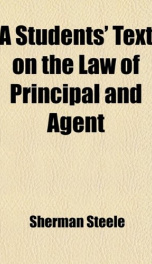a students text on the law of principal and agent

Purchase of this book includes free trial access to www.million-books.com where you can read more than a million books for free. Excerpt from book: Section 3§ 3. Created by law. In most of the definitions it is laid down that the relation of principal and agent is either founded on contract or "created by law." The anomaly of an "agency created by law" is conjured up to explain the liability of a husband or father for necessaries furnished his wife or child, where he himself has refused to provide them.8 The liability in question, clearly, does not depend upon the existence of a relation of principal and agent between the parties;7 but is rather an obligation directly imposed by law out of motives of public policy. Without discussing the wisdom of this practice of attaching legal rules to divisions of law where accurately they do not belong, it may be stated that in this treatment of the subject we are not concerned with '' agency created by law,'' but are to deal with a relation founded on agreement of the parties. § 4. Master and servant. The relation of master and servant is somewhat analogous to that of principal and agent. Different tests have been applied to distinguish them, such as the term of employment, the mode of compensation, the manner of rendering service and the like.8 8 In those cases where the law authorizes a wife to pledge her husband's credit even against his will, it creates a compulsory agency. Benjamin v. Dockham, 134 Mass. 418. textit{1 Thus, the husband is liable though the goods were furnished against his positive orders. He is liable, however, only for what the law deems necessaries and only for a price that the law deems reasonable. In no sense would he be bound by virtue of his wife's agreement, as he would be were she his agent. The liability arises in the absence of any agreement by the wife and hence does not depend upon existence of a relation of principal and agent between husband and wife. s Lang v. Simmons, 64 Wi...
Info about the book
Author:
Series:
Unknown
ISBN:
0314267417
Rating:
5/5 (5)Your rating:
0/5
Languge:
English
Users who have this book
Users who want this book
What readers are saying
What do you think? Write your own comment on this book!
write a commentif you like a students text on the law of principal and agent try:
Other books by this author
Do you want to read a book that interests you? It’s EASY!
Create an account and send a request for reading to other users on the Webpage of the book!

